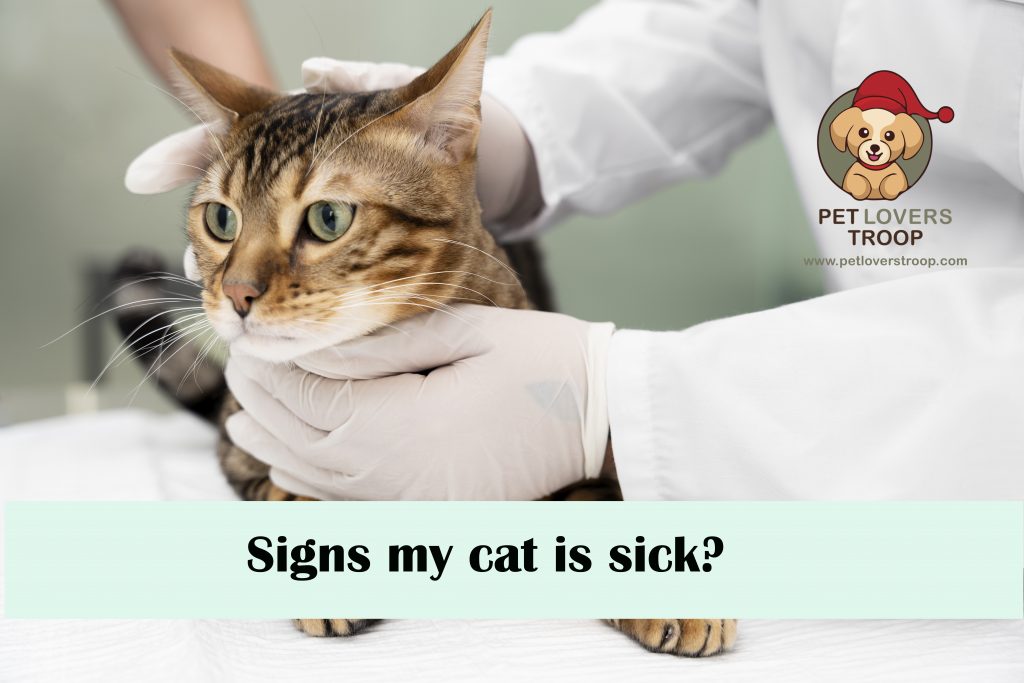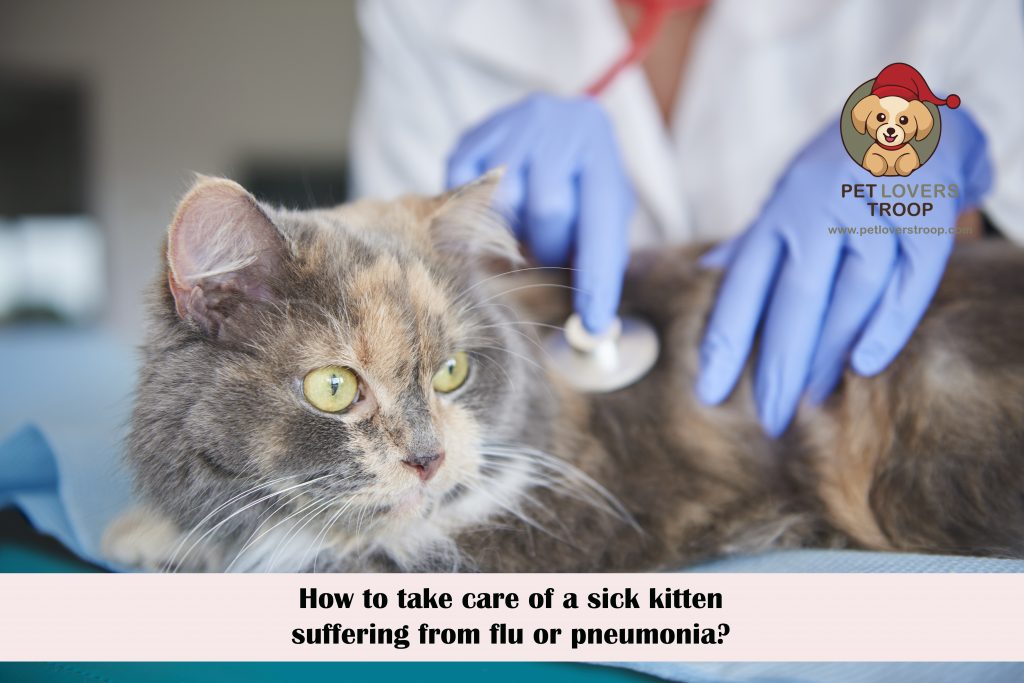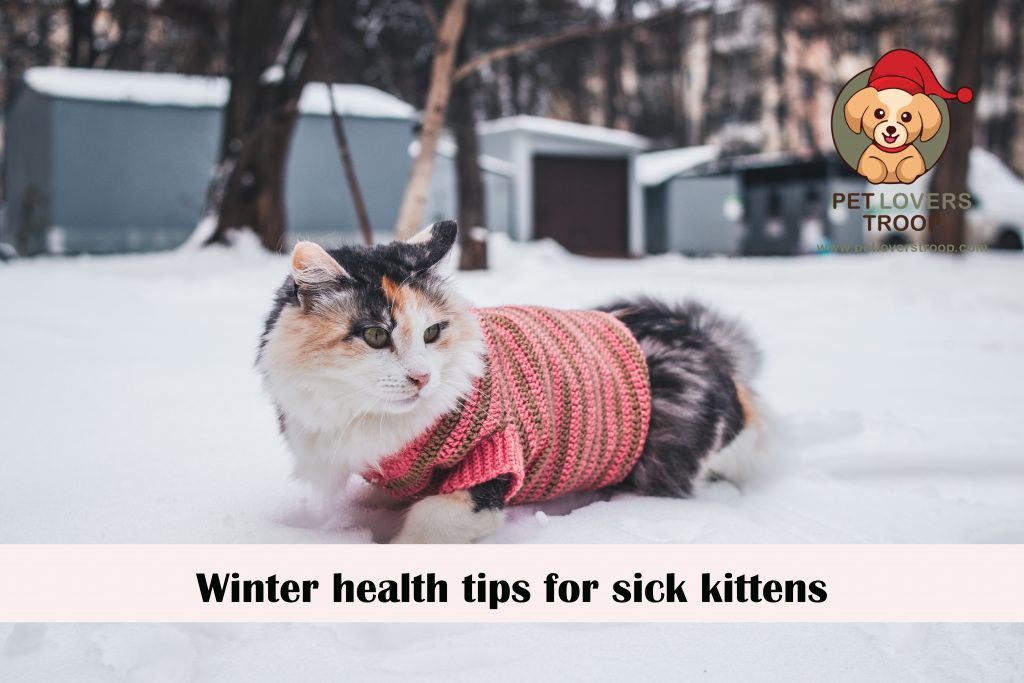Do you have a sick kitten at home that requires extra care and attention? Are you finding it difficult to manage a cat help schedule during the winter? This winter care guide will give you the answers to all your questions.
Does a sick kitten feel cold?
Generally, cats are adaptable animals, and they easily handle winters. Outdoor cats know when it’s time to go back inside, because their body can sense a drop in temperature. The tendency of your kitten to adapt to the cold also depends on its coat. A kitten with a thicker coat will not need as much cat help as a thin coat.
Read More: Dog Training: Ten Essential Commands Every Dog Should Know- June 2023
Winter illnesses in kittens may vary from mild conditions to more severe ones. Dry skin and coldness are milder types, while frostbite and poisoning can be critical. Both of these conditions will require a visit to the vet and prompt medical care.
What temperature is too cold for a sick kitten?

According to vets, any temperature that drops below 45 degrees Fahrenheit is too cold. Kittens that are obese can handle cold better than others because their tiny bodies have a little fat insulation beneath their skin.
Certain kittens may have a higher risk of developing hypothyroidism due to some underlying conditions that they have. These conditions may include any one or all of the following diseases:
- Hypothyroidism
- Renal disease
- Heart disease
- Cancer
Such cold-sensitive cats must be prohibited from going outside, as they have a higher chance of contracting illness. Dry air is another factor that can adversely affect the kitten. However, as a cat owner, the cold season is not the only thing that should be a matter of concern. Maintaining hydration during the cold season is another reason to monitor your cat’s daily diet.
Signs my cat is sick

One of the most common signs that a cat is cold or sick is that it may feel chilly, evidenced by shivering or sitting in a hunch position. Another reason to look under cars during winter is that cats look for warm places or places to hide, and cars provide them with the necessary warmth.
Read More: Planning to buy a fish aquarium? Ten tips that can help you choose the right size and type
A cat that remains in the cold temperature for a longer duration is more likely to develop low body temperatures. If your cat is showing any of these symptoms, rush to the nearest vet for cat help.
- Dilated pupils
- Difficulty in breathing
- Stiffness of muscles
- Low blood pressure
- Slow heartbeat
- Coma in the most severe cases
- Confusion
Winter Illnesses in Kittens
Winter is one of the most troublesome weathers for pets, especially kittens. This change in weather can bring many illnesses to your feline, some of which may require extra caution. Most importantly, cat moms must recognize these signs promptly and rush them to the nearest vet for immediate care.
Pneumonia or Flu
Flu is one of the most common illnesses in humans, but little do people know that this is also a very contagious disease found in cats. The young ones are the most vulnerable to developing the flu compared to the old ones.
Read More: Epileptic Seizures in dogs: Symptoms, associated risks and how to comfort them
Pneumonia also comes with noticeable symptoms, mostly around the respiratory organs. These symptoms include a runny nose, dry cough, or loss of appetite, and can cause lung inflammation. Developing pneumonia or flu is dangerous, and taking your pet to the local vet is advisable.
How to take care of a sick kitten suffering from flu or pneumonia?

Visit your local vet, and get a check-up done. The doctor will prescribe a few medications to help your kitten to feel better. You can even vaccinate your kitten to protect it from pneumonia.
- You can use a cotton wool pad to remove mucus that appears on their eyes or nose, which will help them to feel better and breathe better.
- Keep your kitten free from stress by restricting their movement. The best practice is to keep them in a quiet room where no one disturbs them.
- Your cat must continue to eat. Adding strong-smelling food to the diet can help incentivize your cat to consume food. Fishes such as sardines and tuna are the best choices in such situations. Another option is to warm the food before giving it to your cat, which can also enhance the smell.
- Flu leads to the build-up of mucus in your kitten’s airways. Keeping them in a steamy room will help relieve congestion but remember not to stress them out. If they do not want to stay in a steamy room, avoiding it is better. All these aspects of cat help are important for their recovery.
AntiFreeze Poisoning
Many people do not know the dangers that antifreeze has on their cats. Consuming even a tiny bit of antifreeze can lead to kidney failure and death. If you suspect your kitten has had antifreeze, look out for these symptoms.
- Vomiting
- Drowsiness
- Drunk and uncoordinated
- Seizures
- Difficulty in breathing
Antifreeze poisoning requires immediate medical care, and the sooner you take your cat, the better its chances of survival.
How to protect your kitten from antifreeze poisoning?
Accidental leaks are the most common reason for antifreeze poisoning. Yet, a majority of deaths are avoidable. If you want to keep your kitten safe from antifreeze poisoning, follow these steps:
- Providing cat help by minimizing exposure to antifreeze is important for their safety, which is possible by keeping the chemical away from reach. Keep antifreeze in a sealed container in a cabinet, and make sure that you close the cabinets.
Read More: Traveling with a cat? Do’s and Don’ts of traveling with your furry friend that you must keep in mind
- In case you spill antifreeze, try to wipe it clean as soon as possible. Cats like antifreeze because of its sweet taste. Ensure your cat does not access it until the area is free from the spill.
- Dispose of empty cans and bottles of antifreeze carefully. Follow the instructions on the labels indicating how to dispose of the chemical.
Frostbite
Frostbite happens when a kitten’s skin gets exposed to cold temperatures for a long time. It most commonly affects body parts far from the heart, such as the tail, paws, and ears.
Read More: Common diseases in Persian cats: Signs, symptoms and preventive treatments
A drop in temperature below 32 degrees Fahrenheit increases the chance of developing frostbite.
How to identify frostbite?
Frostbite is easily noticeable, but it may appear after several days because the symptoms begin to appear after the frozen tissues thaw. Here are a few identification points for frostbite
- Pale grey or bluish appearance of the skin
- The body part is cold or brittle when touched
- Pain on the affected body part
- Swelling
- Blisters
- Skin ulcers
- A bacterial infection that develops pus and a foul smell
How to treat a kitten with frostbite?
Start with moving your kitten to a warm and dry area. Make sure that you do not touch the affected part of the body
- If the cat suffers from hypothermia, wrap her in blankets or warm towels to increase the body temperature.
- Do not massage the frostbitten area, as this can worsen the affected body part.
- Treat the area with warm water with an ideal temperature of 104 to 108 degrees Fahrenheit.
- Frostbite may also require medication, depending upon the severity of the condition. Take your cat to the nearest pet for further treatment and cat help.
- Prompt cat help is important since neglected tissues can be permanently damaged; in severe cases, the doctor may amputate the damaged tissue or body part.
Hypothermia
Hypothermia is a mild or severe condition when the body temperature of a feline drops below normal. A temperature between 97 to 99 degrees Fahrenheit is dangerous, and it becomes a serious concern if it falls below 90 degrees Fahrenheit.
Hypothermia affects the functions of all organs in the body and can slow the heart and breathing rates. Eventually, it can lead to death, which is why it is more lethal for kittens than adult cats.
How to identify hypothermia in a kitten
A hypothermic kitten may show symptoms like feeling cold, which may become more noticeable as the severity of hypothermia increases.
- Shivering
- Lethargy or showing signs of weakness
- Confusion
- Lack of response
- Body extremities may feel cold to touch. These include ears, tails, and paws.
- Stiffness
- The pupil appears to be dilated
- Decrease in breathing and heart rate
- Coma
- Loss of consciousness
How to treat a hypothermic kitten?
Mild cases of hypothermia are easily treatable at home. As soon as you notice the symptoms, take precautions by placing your sick kitten in a warm room and warm towels. Regularly check and track the cat’s temperature for any significant temperature change.
When you observe hypothermia, prompt cat help can save your kitten’s life. Symptoms may get worse the longer you wait for treatment. Vets may give warming fluids and a few medications to bring the temperature back to normal.
Skin Dryness
Kittens can also suffer from dry skin, just like humans, which mostly occurs during winter because of the increased use of heaters. Dry skin symptoms include mild itching, irritation, and dandruff may appear on the skin. But, there is not much to worry about since it is an easily treatable condition that requires extra caution and care.
How to prevent dry skin on your sick kitten?
Thankfully, dry skin is a mild case of itching and irritation, and there are certain steps that you can take to make your feline baby comfortable at home
- Installing air humidifiers can improve the humidity in the room.
- Feed your cats a diet full of protein and fats, which helps maintain the supply to oil glands on the skin.
- Adding a fatty supplement may also work, but it is better to take recommendations from your vet for this.
- Brush and groom regularly so that the oil is equally distributed in the fur.
- Providing cat help by using oatmeal shampoos can provide extra moisture to the skin.
Dehydration
Dehydration occurs when the body loses extra fluid from the body, which can happen due to excessive vomiting or diarrhea. Water is really important for your kittens, and ignoring the signs of dehydration can lead to serious medical conditions. Winter nutrition for a sick kitten may differ from summer because the dietary requirements may vary from season to season. In winter, you can add soupy broths to their diet or dry food and treats.
How to tell if a cat is dehydrated?
First and foremost, keep an eye on the water consumption of your kittens. A dehydrated kitten may show the following symptoms
- Lack of energy
- Refusing to eat
- Panting
- Sunken eyes
- Dry gums
- Tacky gums
The Skin Tenting Test
This test is one of the best ways to determine dehydration in cats. To do this test, pinch a small part of the skin near the shoulder. If the skin falls slowly, then the cat is suffering from dehydration. If it does not fall back down, it is a sign of extreme dehydration.
What to do if my kitten is dehydrated?
Taking your sick kitten to the vet is most important in such cases. However, some home remedies that you can follow in the meantime can be:
- Add a little amount of chicken broth to their water. It will add the necessary proteins to their body to regain energy
- Give them wet food instead of dry food, and avoid giving dry treats. Follow a schedule when giving them food to ensure their digestion remains on track.
Winter health tips for sick kittens

Several conditions are easily manageable at home, yet, it is important to take your kitten to the vet. Once the vet diagnoses your kitten’s condition, he will advise a treatment plan, and as a cat parent, it is your responsibility to follow the vet’s recommendations. Your sick kitten may look well after a few doses of medicine, but you must complete the regimen to avoid any recurrence.
Read More: How to Care for a Cat in Winter
If your kitten has fleas, it is better to clean your house deeply. You can also call for extra cat help and discuss the possible flea control and prevention methods with your vet. Inform them of your home’s complete details, including the number of pets you have.
The Takeaway!
Caring for a sick kitten is difficult, especially when you know an ill kitten is way worse than an adult cat. Other than the few pointers we discussed, quarantine your feline pet, as it will help reduce stress and interaction with other pets or humans. Make her as comfortable as possible and monitor her sleep and eating routine.
When you have a sick kitten on your hands, you might want to cuddle it to make everything all right, but it is best if you don’t, as it can worsen its condition.





